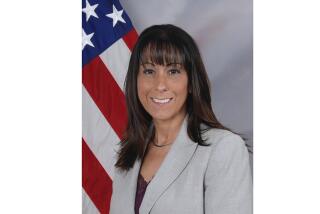Top executives did not report suspected Scout abuse cases, files show
In 1987, a Scoutmaster at a camp in northeast Georgia was accused of fondling a boy in a sleeping bag.
The local Boy Scouts executive, Wayne Brock, followed Scouting procedures and documented the allegation before forwarding it to the group’s Texas headquarters, where it was added to confidential files on leaders suspected of molesting children.
The Scoutmaster was expelled and left town in a matter of days. The police were never told, interviews and records show.
DATABASE: Search the “perversion” files
Today, Brock is the chief executive of the Boy Scouts of America.
As he and his recent predecessors rose through the ranks of Scouting, they handled at least 120 cases of suspected sexual abuse dating from the mid-1970s, according to a Times analysis of confidential Boy Scout files.
As district executives, it was their job to gather evidence and witness statements, determine whether to recommend a leader’s expulsion and report their findings to headquarters, which made the final decision.
In the process, the officials had a front-row seat on cases in which Scouting’s abuse-prevention policies failed.
Although the officials may have followed Scout policy and violated no laws, the files in several cases indicate that they did not inform authorities — or their communities — of suspected child molesters who were expelled from the organization.
The Boy Scouts would not make Brock or the former chief executives available for interviews. Brock did not return calls to his home and cellphone.
In a statement, a spokesman said it was impossible to comment on specific, decades-old files. Instead, the spokesman highlighted the executives’ contributions to abuse-prevention policies, including the requirement in 2010 that any suspicion of abuse be reported to police.
Faced in recent months with the public release of hundreds of files by court order, Scouting officials have acknowledged that “in certain cases, our response to these incidents and our efforts to protect youth were plainly insufficient, inappropriate, or wrong.”
Brock was a regional executive in the Appalachian foothills of Georgia when allegations surfaced that Scoutmaster Peter A. Gross had fondled a boy.
The alleged molestation was witnessed by another Scout, who confronted Gross “in the act,” boys in the troop later told a parent, according to an account in the Boy Scout file on the case.
Gross gathered the boys together and “told them not to tell anybody and that he was having a dream of a pretty lady and that was why he was ‘playing with the Scout’ in bed with him,” the account says.
A few days later, Gross told a Scouting official a different story: The Scout had fallen from his bunk during a “terrible thunderstorm,” according to the file. “I had him sleep with me to calm him. Nothing else happened!”
In a recent interview, Gross said that story sounded far-fetched and insisted he never told it. He denied fondling the boy and said he can’t explain why the troop accused him.
Brock forwarded the allegations to Scouting headquarters. The file contains no indication that Brock or other Scouting officials notified law enforcement. The Rabun County sheriff’s office said they had no record of being told, and Gross and a local Scouting official said they were never contacted by authorities.
On April 8, 1988, headquarters notified Brock of Gross’ expulsion. Four days later, a change in Georgia law went into effect requiring employees of youth organizations to report suspected abuse to law enforcement.
Because Brock learned of the alleged abuse before the new law took effect, it isn’t clear whether he was required to report it to authorities.
J. Tom Morgan, a former district attorney of DeKalb County and coauthor of the law, said it was unlikely to be applied retroactively, even by a few days.
Melissa Carter, director of Emory University’s Barton Child Law and Policy Center, disagreed: “If he had reasonable cause to believe a child had been abused, that is knowledge that persists over time,” she said. “That was no different on April 8 than on April 13.”
Carter and Morgan agreed on one thing: Brock should have reported the allegations to police.
Days after being accused, Gross said, he moved to Florida for a few years. Today, he is a truck driver living 20 miles from where the alleged incident took place.
Few know about the allegations, and Gross, who has no criminal record, said he hopes it stays that way.
“I was fortunate that it didn’t go any further,” Gross said. “I was thankful for that.”
::
Brock’s predecessor, Robert Mazzuca, spent two decades as a regional Scout executive in California and Pennsylvania. He sent an average of one case a year to headquarters detailing allegations of child molestation.
One of Mazzuca’s cases involved David Cooley, an assistant Scoutmaster in a Pittsburgh suburb who was expelled in 1997 after police discovered he had made videos of himself having sex with boys. Cooley pleaded guilty to molesting three boys and was sentenced to up to 54 years in prison.
Mazzuca and his superiors learned only later, after Cooley’s arrest, that he had been convicted in 1987 of molesting a South Carolina boy and served three years in prison. Scouting did not require criminal background checks for volunteers at the time.
Mazzuca told reporters at the time that screening of volunteers was the responsibility of the local nonprofits or church groups that sponsored the troop, not the Boy Scouts.
A decade later, when Mazzuca was chief executive, the organization began requiring all volunteers to have criminal background checks. Mazzuca retired in September.
His predecessor, Roy L. Williams, handled at least 13 abuse allegations while serving as a Scout executive over three decades in Arkansas, Kansas and Rhode Island, records show.
In 1990, Boy Scouts headquarters asked Williams to obtain a written statement from an alleged abuse victim in Rhode Island. The former Scout, by then an adult, said he and his younger brother had been raped in the 1970s by a longtime Scout leader, Father Edmond Micarelli.
Williams sent the statement to headquarters, leading to the priest’s expulsion from Scouting. There is no indication in the file that he reported the alleged rapes to police or looked into whether Micarelli, who had been active in Scouting as recently as 1988, had other victims in the Boy Scouts.
In 2002, the Diocese of Providence paid $13.5 million to 36 victims who sued Micarelli and 10 other priests, alleging sex abuse dating to the 1970s. Micarelli, who is retired in Florida and has no criminal record, could not be reached for comment.
While Williams was chief executive from 2000 to 2007, the Boy Scouts encouraged volunteers and parents to take abuse prevention training.
Jere Ratcliffe served as Scouting’s chief executive from 1993 to 2000, a period when the organization began hosting an abuse prevention symposium and publishing information about sexual abuse in the Scout handbook. Earlier in his career, Ratcliffe handled more than 65 cases of alleged abuse as a regional executive in South Carolina, Missouri, Alabama and Chicago.
In most of the cases, Scouting officials learned about alleged abuse from law enforcement or newspaper reports. But in several cases where Scouts received reports directly from victims or their parents, there is no sign the allegations were reported to law enforcement.
In one, the failure to report abuse may have allowed a suspected serial child molester to abuse again.
In 1982, Ratcliffe learned that Birmingham, Ala., Scoutmaster Ricky C. Partain had allegedly made sexual advances toward an 11-year-old boy he had taken to a wrestling match, the Boy Scout files show.
The boy had shared a bed with Partain at the house of an acquaintance, who heard the boy shouting, “No, no, coach — you can’t make me do it!” the file says.
Ratcliffe could not find Partain’s name on a registry of local Scout leaders and apparently let the matter go, according to the file.
Two years later, when a new complaint emerged, Ratcliffe learned that Partain had been working in a local troop all along. Parents of one Scout alleged that Partain had fondled the boy twice while teaching him to swim.
In September 1984, Ratcliffe sent a confidential report on Partain to Scouting headquarters, the files shows. There is no indication he informed police.
In 1989, records show Partain was convicted of molesting an 11-year-old girl and today is registered as a sex offender in Alabama.
More to Read
Start your day right
Sign up for Essential California for news, features and recommendations from the L.A. Times and beyond in your inbox six days a week.
You may occasionally receive promotional content from the Los Angeles Times.






